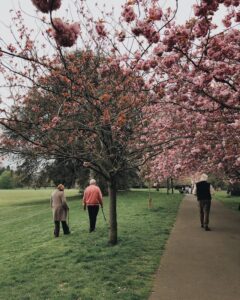08 Nov Living with dying

Living with dying. Even though we know that one day everything alive will die, feeling our own – or a loved ones dying – is a very complex and emotional process. Until you experience it yourself, it is very hard to imagine.
the finitude of our lives
Until we are personally confronted with death, most of us assume we have many years left to live. This is healthy and very normal. We make plans far into the future, picturing our death a long way in the distance. If we are faced with something like a terminal illness, it drastically changes our world. From somewhere, we have no choice but to find the courage to walk into a new world that is very difficult to prepare for.
“We all have two lives. The second one begins when we realise we only have one.” Confucius
When life is so drastically changing and possibilities seem limited, it can be overwhelming. Having a place for these feelings, can help us find some strength (1). Existential psychotherapist Irvin Yalom describes dying as an altering of our perspective, which can shift how we live (2). Allowing us to see what choices we have and what we can do, before what we may be telling ourselves we must do (E).

end of life matters
Talking about the end of our lives is not easy, but talking about it with sensitivity normalises it. These conversations are about discovering what is important to you, not anyone else. If we can talk about and feel what matters and is true to us, not leaving it too late, it gives us a chance to live fuller. Sharing our fears also help us illuminate our priorities. How we live and what we appreciate may start to shift (3). Fears and anxieties may be felt less strongly.
“Death is not the opposite of life, but a part of it” - Haruki Murakami

connecting with life
When death comes into your life, it changes your relationship with others. Sometimes the connection with those you love deepens, other times you lose the connection. You may be grieving in different ways, or struggle to understand what you are each going through. Connection through end of life is supported through the things you do together. Big or small. Sadness and laughter can exist at the same time. Keeping you connected in life together.
“The days that make us happy make us wise” - John Masefield
Meaning is made in all these fleeting moments. When we give these moments our full attention, it can ease loneliness and feelings of unease. These moments take many forms. Sharing your important life stories, your hopes and your dreams for those you love. In these moments, an appreciation of the value of the life you still share can form. It can also give you an increased sense of peace and leave your loved ones with a grief that is easier to bare.

Finding calm
One day all our bodies will start to have problems. It may be the most challenging thing we go through. How can we find the conversations, concepts and abilities to support us through? Australian teacher and celebrant Zenith Virago offers the distinction of being with what is, not with what if – as one means to grow our ability when we navigate our end of life.
“You exist as you are, and that is enough” - Barbara Fredrickson
In our society we also live with unspoken truths about the concept of time. We say that “time is of the essence”. We think of time as something we can spend, lose or invest. If we are in a process of dying and wanting to find some calm, how does this thinking impact on our sense of ability to act on what matters to us? If we allow time to be a bit more dreamy, can we see our dying as less of loss and decline?

Might it help an unhurried experience of living if we replaced descriptive words of time like arrive and depart – with words like emerge and continue? Maybe then we can rest in quality of time. Maybe we can drop the focus of the timeline (4).
“Death in its ever-present possibility makes love, passionate love, more possible” - Abraham Maslow
When life is changing, and dreams are being taken away, it is shattering. Zen Buddist and hospice worker Frank Ostaseski says that this grief, felt in all of our lives, can turn into connectedness. Whilst end of life is hard, and we often get to hear the hard and scary stories, he says it doesn’t have to be only that. He offers this knowing as an invitation to not wait. If we somehow can embrace change, even expect it – then we can embrace our lives. And find some calm in what is.

“When I'm gone, I won't be gone. Being known makes me feel relaxed. I don't worry.” - Dan Siegel
Loving support

“Some things in life are too hard to see by yourself because they take up the whole sky” - Stephen Jenkinson
Health researcher Atul Gawande points out that the process of dying involves living (8). When someone loving is with you, giving attention to your most vulnerable thoughts, you can find what this living looks like to you. These conversations can happen at home, in hospital, with a death doula or with a therapist. Finding your priorities, wishes and what has meaning to you, has never been more important.

Sources
(1) Leonard R. et al. (2017). Identity and the End‐of‐Life Story: A Role for Psychologists, Australian Psychologist, 52:5, 346-353,
2) Yalom, I. (1980). Existential psychotherapy. BasicBooks.
3,8) Gawande, A. (2014). Being Mortal – Medicine and What Matters in the End. Picador Metropolitan Books, New York.
4) Ideas inspired by: Graham, J. & Stephenson, P. (2010). Contesting Aging and Loss. Chapter 1: Age and Time: Contesting the Paradigm of Loss in the Age of Novelty. University of Toronto Press.
5) VAİPHEİ, S. D. (2020). Significance of Psychotherapeutic Approach Toward Terminal Ill Diagnosis in Clinical Practices. Journal of contemporary medicine., 10(3), 454–457.
6) Newton, J. C., et al. (2021). The role of psychosocial support in the experiences of people living with advanced cancer: A qualitative exploration of patients’ perspectives. Psycho-Oncology, 30(3), 287-295.
7) Ostaseski, F. (2017). The Five invitations – Discovering What Death Can Teach Us About Living Fully. McPherson’s Printing Group.
Recommended resources
Inviting the Wisdom of Death into Life
Frank Ostaseski is a leading voice in end of life care. In his work, he has helped thousands of people face death. He says, no matter how many times we do the same thing, there will come a time when we do it for the last time. In this talk, Frank speaks about death and dying—and about how an awareness of death can be a valuable companion for living well

dying2learn
CareSearch in Australia organise free courses on death and dying. Their courses facilitate supportive discussions on a range of topics like advanced care planning, our digital legacy, funeral planning and palliative care. They also have a rich library of general information and resources, available here. NSW Health also has supportive pages available here.
Being Mortal – Medicine and What Matters in the End
Atul Gawande is a public health researcher, surgeon and professor. In this talk he highlights the importance of asking what wishes we have as we near the end of life. How do we start these difficult conversations? If we can be supported in having these conversations, maybe we can go further than having a good death. Maybe then we can also have a good life, all the way to the end.

How to have a real and deep conversation
Kathryn Mannix is the author of the book “Listen”. When we really care about someone, the idea of raising certain topics and conversations can seem almost impossible. We are so fearful to get it wrong. In this eight minute conversation, she gives tips and hints about how to have these tender conversations.
Site links:
If you struggle with your thoughts and your feelings, reach out to a professional. If you are in Australia, the Lifeline helpline (13 11 14) is open 24 hours. You can also follow this link for other crisis supports pages.





Sorry, the comment form is closed at this time.